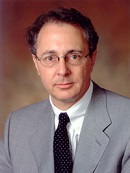 |
| Roger Perlmutter--Courtesy of Amgen |
Roger Perlmutter is back. About a year after the Amgen ($AMGN) R&D chief was squeezed out in a top-level reshuffling at the big biotech, Merck ($MRK) says they have tapped him to run the Big Pharma's research house, which has been consuming $8 billion a year without a lot to show for it.
Perlmutter is taking the place of Peter Kim, who plans to work with the new research chief during an interim period before stepping out. Then Kim will stay on as an advisor until his retirement in August. The move marks a homecoming of sorts for Perlmutter, who worked at Merck in a senior research position before moving to Amgen, where he stayed for 11 years.
At Amgen, Perlmutter delighted in pulling off a string of deals that tilted the company's pipeline heavily toward a group of late-stage assets. And he clearly loved intricate, promising new assaults on cancer. Under his direction Amgen bought out Germany's Micromet, which was developing antibody-directed T cell attacks against cancer. Earlier, he bought out BioVex, a 2009 Fierce 15 company, snagging its late-stage therapeutic cancer vaccine in a billion-dollar deal. The BioVex deal delivered OncoVex, which uses a cancer-destroying virus modified from a cold sore virus designed to replicate in solid tumors while spurring the immune system to go in and tackle the cancer as well.
But the acquisitions along with other late-stage programs like AMG 386, ganitumab (AMG 479), and AMG 145 fueled a spike in R&D costs, pushing the share of research expenses to revenue to about 20%. As a result, Amgen was forced to axe 380 R&D workers in a reorganization to help placate restive investors and improve the math at Amgen. But it didn't work.
"You have a high level of investor dissatisfaction," Bernstein's Geoffrey Porges told The New York Times in 2011, as Perlmutter and CEO Kevin Sharer stepped down. "You can clearly see the hand of the investors and the market in these transitions."
 |
| Merck CEO Kenneth Frazier--Courtesy of Merck |
Merck, though, has steadfastly refused to restructure R&D, maintaining one of the biggest research budgets in the business. But there's been some growing restiveness at Merck as well, and Perlmutter's arrival appears designed to address that.
The company essentially abandoned its pricey effort on biosimilars. Its late-stage pipeline story is also riddled with gaping holes. It's all over for Tredaptive as a prospective heart drug after a host of adverse reactions--evidently triggered by niacin--matched with a failure on efficacy brought the program down. Merck faces a big delay for the osteoporosis drug odanacatib and plenty of analysts are fretting over the future of anacetrapib, a CETP inhibitor following the same biologic path that led to two major failures at Pfizer ($PFE) and Roche ($RHHBY). Then there's Bridion (sugammadex), an anesthesia-reversing treatment originally rejected by regulators five years ago, which has lingered as a top prospect in anticipation of new data.
Last November, just three months after quietly snuffing its late-stage development program for the cholesterol combo (extended release niacin, now linked to serious adverse events, and Zocor) MK-0524B, Merck also doused development efforts on a new cholesterol therapy--MK-0431E--once in line for a 2014 regulatory filing.
Kim's most noticeable accomplishment was the development of the mega-blockbuster Januvia. But that approval dates all the way back to 2006.
Perlmutter will now have his hands full trying to redirect a research house that has clearly gone astray. But he's been well schooled in fields like heart disease and osteoporosis, critical diseases for Merck. One of his big achievements at Amgen was the successful development of the osteoporosis drug denosumab.
"Roger is a world-class physician-scientist with a proven track record of leading large research organizations and delivering a broad and diverse pipeline of medicines," said Merck CEO Ken Frazier. "With his deep knowledge of the ongoing changes in the industry's external environment and their implications for how we use R&D resources, Roger is ideally suited to lead Merck's global research and development
- here's the press release
Special Report: Merck - The Biggest R&D Spenders In Biopharma